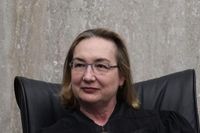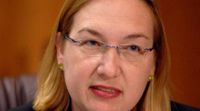In a significant move that has sparked controversy, the Trump administration filed a request on March 21, 2025, demanding that U.S. District Judge Beryl Howell disqualify herself from overseeing the Perkins Coie lawsuit. The legal team representing President Donald Trump’s administration cited what they described as a "pattern of hostility" toward the president, arguing that Howell has repeatedly demonstrated partiality against him.
The Justice Department's team included Chad Mizelle, acting associate attorney general, and Richard Lawson, deputy associate attorney general. In their motion, they claimed, "Reasonable observers may well view this Court as insufficiently impartial to adjudicate the meritless challenges to President Trump’s efforts to implement the agenda that the American people elected him to carry out." Their action comes in light of several rulings and statements made by Howell that they perceive as bias against Trump.
Judge Howell, who was appointed by President Barack Obama, previously issued a temporary restraining order blocking parts of Trump’s executive order that rescinded security clearances for Perkins Coie lawyers, an order that restricted their access to federal government buildings as well. The administration's motion suggested that her comments during a Women’s White Collar Defense Association event in November 2023 further exemplified her partiality. At that event, Howell remarked that the country was at a crossroads leading toward authoritarianism, a sentiment that has echoed throughout the political landscape and garnered the attention of Rep. Elise Stefanik, who filed a judicial misconduct complaint against her in December 2023.
Further criticism of Howell came during a March 12 hearing, where she remarked that Trump had a "bee in his bonnet" about Fusion GPS, a firm involved in opposition research during the 2016 presidential election. She pointedly noted, "He keeps bringing it up. It’s like he doesn’t want any of us to forget Fusion GPS." Such comments have raised eyebrows among Trump's legal team, who view them as indicative of Howell's perceived animus toward the president.
In their filings, the Justice Department also referenced several contentious interactions Howell has had with the court. Her tenure has not been without controversy; she has presided over significant cases involving Trump, including rulings that have allowed prosecutors to access Trump's attorney’s communications regarding classified documents. They argued that her actions demonstrate a consistent bias that undermines the fairness necessary for her role.
The motion also pointed out Howell's previous rulings regarding the January 6 insurrection cases and the related prosecution efforts against Trump's supporters, alleging that she has not concealed her disdain for the former president.
In a broader context, this request marks a continuation of a trend seen since Trump took office, where he and his administration have increasingly sought to disqualify judges who have ruled against them. Earlier this week, the Justice Department requested the removal of Chief Judge James Boasberg from a notable deportation case concerning alleged Venezuelan gang members, demonstrating a pattern in the administration's approach to the judiciary.
This use of disqualification requests has been labeled as a legal playbook favored by Trump, who has a history of publicly attacking judges he believes are unfair. Such accusations underline a growing tension between the executive branch and the judiciary, especially in cases that involve Trump's actions as president.
The response from Howell regarding the disqualification request is awaited as she has yet to respond to media inquiries. As it stands, the Perkins Coie lawsuit is set to continue in the upcoming weeks, where Howell will also consider arguments about the constitutionality of Trump’s original executive order next month.
Amidst these developments, Gerald Herbert, a political analyst, noted, "It’s troubling to see the administration engaging in tactics that undermine trust in judicial independence. This could set a dangerous precedent for future administrations as well." The growing disputes reflect a vibrant yet contentious political atmosphere, with judges at the center of this storm being scrutinized for their past rulings and public statements.
In the meantime, how this legal battle will unfold remains uncertain, but it illustrates the broader conflict between Trump and the judicial system, which has often been a counterbalance to presidential power during his administration. As the Perkins Coie case progresses, it may also illuminate the future of executive authority under scrutiny.
The situation represents not just a legal conflict, but a symbolic battle over authority and control, teetering on the brink of a much larger constitutional debate about the limits of presidential power and the role of the judiciary as a check on that power. The coming weeks will be pivotal as the implications of Judge Howell's rulings and the responses from the executive branch continue to shape the landscape of U.S. governance.









